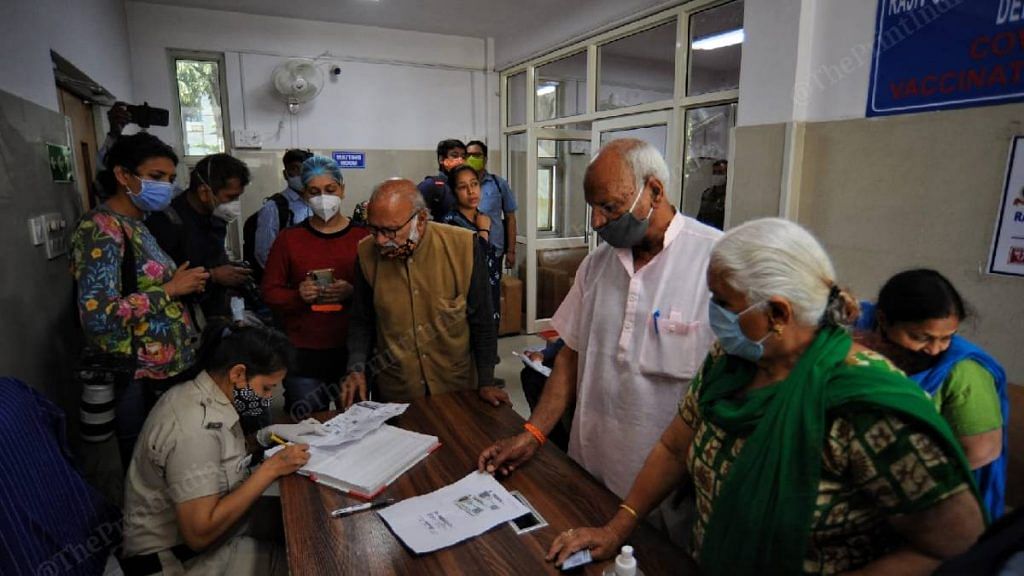New Delhi: There have been no glitches in the CoWin software but there was some confusion since people were looking for an app when none existed, said the government Tuesday.
Fifty lakh people, using the relatively new CoWin portal and the Aarogya Setu app that was set up earlier, registered to get their Covid-19 vaccine shot on the first day of the second phase of the immunisation drive.
Dr R.S. Sharma, head of the empowered group on Covid-19 vaccinations, said, “There were some glitches in the first version of the software that we unveiled on 16 January but yesterday (1 March) there were none. Just that people were looking for an app and they happened to find one that looked authentic but that was not made for that purpose.”
“We issued a clarification that there is no CoWin app but registration is either through the portal of that name or the Aarogya Setu app … there may have been some issues but if they were major, then so many people would not have been able to register in a single day,” he added.
The second phase that began on 1 March opened up vaccinations for the second priority group — the elderly (60 years and above) and for people with comorbidities aged 45 and above. Comorbidities are existing diseases that make people more vulnerable to adverse Covid-19 outcomes. Vaccinations are being administered at around 27,000 hospitals, of which around 12,000 are in the private sector.
As of Tuesday 1 pm, India had administered 1,48,55,073 doses of vaccine of which 2,08,791 were given to people in the second priority group.
In the first phase, which targeted healthcare and frontline workers who are about 3 crore in number, 25,98,192 healthcare workers were fully vaccinated while 67,04,856 have received only the first dose. Among frontline workers, 53,43,219 received their first shot.
The vaccinations — Bharat Biotech’s Covaxin and Oxford-AstraZeneca’s Covishield — are being administered as two shots, spaced 28 days apart.
Several states including Madhya Pradesh, Odisha, Rajasthan, Jharkhand and Karnataka have vaccinated 90-100 per cent of their healthcare workers. Tamil Nadu, which got off to a slow start, also managed to vaccinate 100 per cent of its health workers.
Also read: CoWIN glitches, confusion, long queues at hospitals mark day 1 of Covid vaccination phase 2
‘Not time yet to go for weddings, parties’
With cases rising again, India appears to be in the middle of a resurgence of Covid-19.
Dr V.K. Paul, member (health) Niti Aayog, said that in the Centre’s interactions with states, what has come to light is that the wedding season and elections are responsible for the surge to some extent.
Maharashtra and Kerala currently account for about 75 per cent of the active cases in the country.
“From what we understand, so far it is not a new variant that is powering the surge but state governments have told us that the wedding season is on and also local elections are among the reasons for the surge … please avoid gatherings, weddings and parties. The time for those has not come yet,” Dr Paul said.
Kerala, West Bengal, Assam, Tamil Nadu and Puducherry are headed for assembly elections, beginning 27 March.
To break the chain of transmission, Dr Paul said it is important that 15-20 contacts are traced per positive patient and quarantined for a reasonable period.
‘Monitoring CoWin user experience’
About the CoWin portal, empowered committee chief Dr Sharma said a system has been put in place for monitoring the user experience as well as to look for glitches.
“We are looking at how long a person takes to register from the time they have logged in. We had done this also at the time of Aadhaar. Anecdotes are in one place, but we are taking data driven decisions,” he said.
Health Secretary Rajesh Bhushan said that the portal also allows sufficient flexibility to vaccination sites to schedule appointments according to their capacity rather than imposing a one-size-fits-all model.
Also read: Co-WIN app meant for administrators, vaccine registration to be done via portal — Govt
